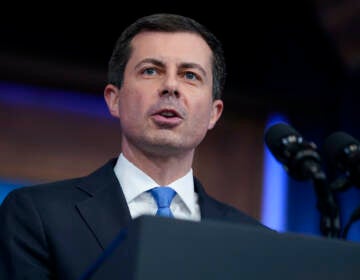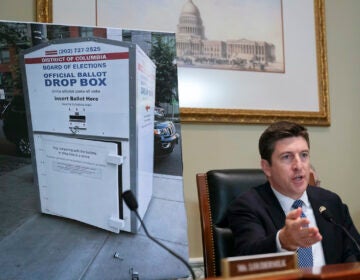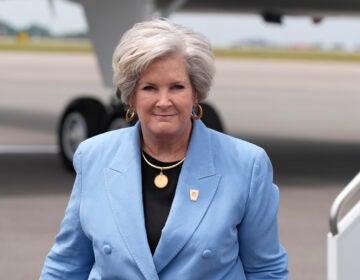Will Pa. ‘go blue’ in the 2024 elections? Stop Trump Summit mulls over the Keystone State’s role in the election
The New Republic magazine gathered local and national figures to discuss concerns about a second Trump administration.

Demonstrators protest outside of the U.S. Capitol, during a House vote to measure limiting President Donald Trump's ability to take military action against Iran, on Capitol Hill, in Washington, Thursday, Jan. 9, 2020. (AP Photo/Jose Luis Magana)
What questions do you have about the 2024 elections? What major issues do you want candidates to address? Let us know.
An evaluation of Trump’s first term, his legal battles, the state of abortion rights and voting rights, and strategies to defeat the former president and the MAGA movement in November’s elections were some of the key highlights of the “Stop Trump Summit” in Philadelphia on Saturday.
Hosted by The New Republic (TNR), a left leaning magazine, the conference drew prominent national and local figures who meditated on the potential dangers of another Trump presidency.
Michael Tomasky, TNR’s editor, kicked off the summit by talking about the constitution, which he noted was signed “just down the street.”
“It’s been under fresh reexamination and scrutiny here in recent years for some of the things that are in it, beginning, of course, with slavery and the three-fifths clause, but extending to lifetime appointments for Supreme Court justices – that seems to have become a little bit of a problem,” he said.
Tomasky addressed the Electoral College and the U.S. Senate which, he said, gives disproportionate representation to states such as Wyoming with its population of 650,000 at the expense of highly-populated states such as California and Pennsylvania.
He said, despite those flaws, there are laws “greater than any one person’s ambitions or desires” but “that proposition is being challenged today in a way it has not yet been in these United States, and that’s why we’re all here today.”
Here are a few highlights from the summit:
Which Way, Pa?
One of the panel discussions centered on which direction Pennsylvania will swing and what Democrats and activists can do to ensure the Keystone State “goes Blue.”
Will Bunch, a Philadelphia Inquirer columnist, who served as a moderator, asked panelists their observations on the upcoming election as compared to the same match-up between Joe Biden and Donald Trump four years ago.
“I think the thing that’s different this time is that we have a much bigger percentage of people that are likely just to opt out,” said JJ Abbott, executive director of Harrisburg-based Commonwealth Communications, who previously served as a spokesperson for Gov. Tom Wolf. “They’re likely to see politics as just not serving them.”
Kadida Kenner, CEO of the New Pennsylvania Project, a voting rights organization which focuses on voter registration and civic education, said that there is a feeling of apathy especially prevalent among young voters and voters of color including black, immigrant, and native constituents.
“These are the communities that must be engaged more heavily than ever before,” she said. “We all know that it’s the black vote that is winning these elections for these Democrats. And if we don’t have turnout in this election by black folks to save democracy one more time, we will be in trouble.”
Pa. State Senator Vincent Hughes said that Democrats simply need to reinforce the message that the president has accomplished a lot in his first term.
“I’m the glass half full guy. Okay? I’m not the glass half empty,” Hughes said. “I got a president who’s got a hell of a record to stand on… a record with the lowest unemployment rate in history, a record with massive investments, first black vice president, female vice president, first black female Supreme Court justice, more diversity on the federal bench.”
Abbott is optimistic that young voters will, ultimately, come out for President Biden.
“It’s about a future where they have a president that they may not like but will at least listen to them on things like student debt, on things like medical marijuana, even reproductive rights,” he said. “Joe Biden has moved in a positive direction because he’s been pushed by young organizers who have led the fight to make sure that he’s fighting for them.”
Kenner noted that 70% of voters her organization has registered recently are under 35-years old and they need to be courted.
“You can’t just register them to vote and then walk away,” she said. “You have to talk about the issues and listen to the issues they care about the most and thinking about their future. And young folks aren’t any different than anybody else in this room. They care about the economy, they care about paying the bills, they care about inflation, they care about their student loans.”
Hughes also asked Pennsylvania voters to remember that the Pa. State House of Representatives and Senate hang in the balance.
Abortion is a hot issue
Salon senior politics writer Amanda Marcotte led a panel titled “Will abortion decide this election?”
Local speakers Lizbeth Rodriguez of the Philadelphia Women’s Center, Drexel University law professor David Cohen, and Rutgers Law professor Kimberly Mutcherson participated in the discussion.
Marcott asked how the Supreme Court’s decision in Dobbs v. Jackson Women’s Health Organization which overturned Roe v. Wade has affected abortion access in the state.
“In Pennsylvania, abortion is legal,” Rodriguez said. “However, legality has never meant accessibility for folks. For a lot of marginalized communities, these barriers, bad laws and restrictions on providers have been affecting us for the past 50 years.”
Cohen said states like Pennsylvania have a responsibility to expand access.
“We’ve seen states around the country where abortion remains legal, where pro-choice legislators and governors have actually started actually doing what we’ve wanted them to do for decades – which is get rid of restrictions that have remained on the books even in liberal states and fund abortion,” he said.
Panelists said they are seeing some women come to Pennsylvania from other states seeking abortion support. But Rodriguez says the state is “still very restricted.”
“We have the Pennsylvania Abortion Control Act with mandatory waiting periods, restrictions on young folks, and a number of restrictions on providers that truly make it difficult for folks in red states to come and seek care here,” she said.
Mutcherson told Marcotte that New Jersey has gone much farther in terms of expanding access.
“There are lots of jokes about New Jersey, but if you are a person who cares about reproductive healthcare and abortion in particular, New Jersey is at the top of the list,” she said. “We have a great reproductive freedom act that was passed even before Dobbs came down. We do not have the kinds of restrictions that a lot of states have, including gestational limits. You can use Medicaid to pay for abortion in New Jersey. So low income women have access to abortion in ways that are not true in a lot of other states.”
All eyes on PA
Biden is expected to heavily focus on Pennsylvania this election cycle, given the importance of a win for either candidate but also his affinity for his birth state.
“Biden loves Pennsylvania,” writer and author Molly Jong-Fast said, noting that a Biden staff member told her “Biden is always in a good mood when we go to Harrisburg.”
She added that she doesn’t believe in polls – which are giving an edge to Donald Trump in Pennsylvania – and that Biden had advantages the former president doesn’t.
Biden is “a politician because he’s good at connecting with people,” she said.
Saturday’s event was co-sponsored by Project on Government Oversight. Other speakers included University of Pennsylvania law professor Claire Finkelstein, Drexel Kline School of Law professor David Cohen, The Lincoln Project co-founder Rick Wilson, Salon politics writer Amanda Marcotte, Democracy Forward CEO Skye Perryman, The New Republic staff writer Walter Shapiro, and POGO Action policy counsel Joe Spielberger.

Get daily updates from WHYY News!
WHYY is your source for fact-based, in-depth journalism and information. As a nonprofit organization, we rely on financial support from readers like you. Please give today.







